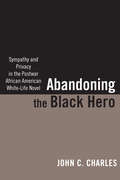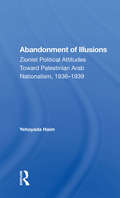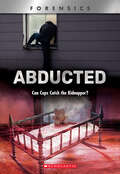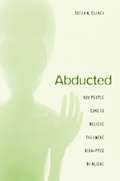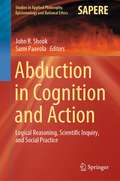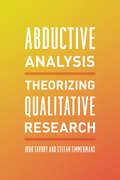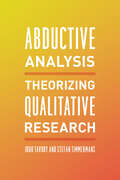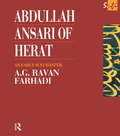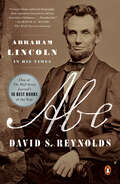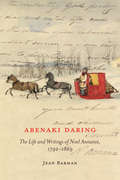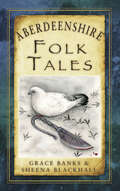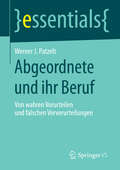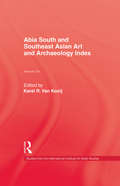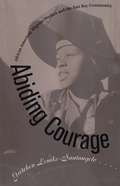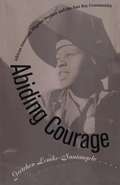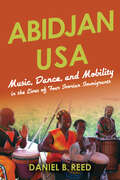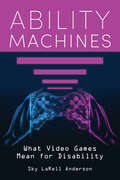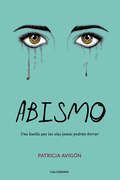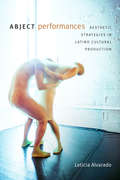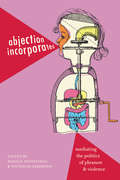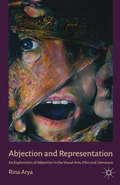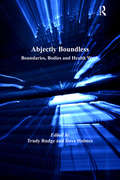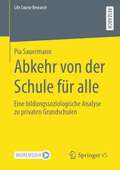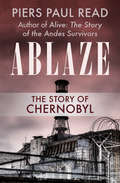- Table View
- List View
Abandoning the Black Hero: Sympathy and Privacy in the Postwar African American White-Life Novel
by John C. CharlesAbandoning the Black Hero is the first book to examine the postwar African American white-life novel--novels with white protagonists written by African Americans. These fascinating works have been understudied despite having been written by such defining figures in the tradition as Richard Wright, Zora Neale Hurston, James Baldwin, Ann Petry, and Chester Himes, as well as lesser known but formerly best-selling authors Willard Motley and Frank Yerby.John C. Charles argues that these fictions have been overlooked because they deviate from two critical suppositions: that black literature is always about black life and that when it represents whiteness, it must attack white supremacy. The authors are, however, quite sympathetic in the treatment of their white protagonists, which Charles contends should be read not as a failure of racial pride but instead as a strategy for claiming creative freedom, expansive moral authority, and critical agency.In an era when "Negro writers" were expected to protest, their sympathetic treatment of white suffering grants these authors a degree of racial privacy previously unavailable to them. White writers, after all, have the privilege of racial privacy because they are never pressured to write only about white life. Charles reveals that the freedom to abandon the "Negro problem" encouraged these authors to explore a range of new genres and themes, generating a strikingly diverse body of novels that significantly revise our understanding of mid-twentieth-century black writing.
Abandonment Of Illusions: Zionist Political Attitudes Toward Palestinian Arab Nationalism, 1936-1939
by Yehoyada HaimSince the late nineteenth century and especially in times of great tension in the Middle East, observers have asked whether the longstanding Arab-Jewish conflict could have been avoided. The early Zionists did not feel that Arab nationalism would evolve as a reaction to Jewish settlement and the pursuit of Jewish statehood; to the Zionists it seeme
Abducted: Can Cops Catch the Kidnapper? (XBooks: Forensics)
by Diane WebberCan the kidnapper be caught?Charles Lindbergh was a very famous public figure whose son was kidnapped from his crib. Much of the investigation was based on a series of ransom notes which ultimately led to the conviction of a suspect.High-interest topics, real stories, engaging design, and astonishing photos are the building blocks of the XBooks, a new series of books designed to engage and motivate reluctant and enthusiastic readers alike. How can DNA help a convicted person prove their innocence? How did a burglar steal from a store without leaving any fingerprints? Why was the tiny town in Hardin, Missouri, awash with skeletons after a huge flood? With topics based in science, these action-packed books will help students unlock the power and pleasure of reading... and always ask for more!
Abducted: How People Come To Believe They Were Kidnapped By Aliens
by Susan A. ClancyThey are tiny. They are tall. They are gray. They are green. They survey our world with enormous glowing eyes. To conduct their shocking experiments, they creep in at night to carry humans off to their spaceships. Yet there is no evidence that they exist at all. So how could anyone believe he or she was abducted by aliens? Or want to believe it? To answer these questions, psychologist Susan Clancy interviewed and evaluated "abductees"--old and young, male and female, religious and agnostic. She listened closely to their stories--how they struggled to explain something strange in their remembered experience, how abduction seemed plausible, and how, having suspected abduction, they began to recollect it, aided by suggestion and hypnosis. Clancy argues that abductees are sane and intelligent people who have unwittingly created vivid false memories from a toxic mix of nightmares, culturally available texts (abduction reports began only after stories of extraterrestrials appeared in films and on TV), and a powerful drive for meaning that science is unable to satisfy. For them, otherworldly terror can become a transforming, even inspiring experience. "Being abducted," writes Clancy, "may be a baptism in the new religion of this millennium. " This book is not only a subtle exploration of the workings of memory, but a sensitive inquiry into the nature of belief.
Abduction in Cognition and Action: Logical Reasoning, Scientific Inquiry, and Social Practice (Studies in Applied Philosophy, Epistemology and Rational Ethics #59)
by John R. Shook Sami PaavolaThis book gathers together novel essays on the state-of-the-art research into the logic and practice of abduction. In many ways, abduction has become established and essential to several fields, such as logic, cognitive science, artificial intelligence, philosophy of science, and methodology. In recent years this interest in abduction’s many aspects and functions has accelerated. There are evidently several different interpretations and uses for abduction. Many fundamental questions on abduction remain open. How is abduction manifested in human cognition and intelligence? What kinds or types of abduction can be discerned? What is the role for abduction in inquiry and mathematical discovery? The chapters aim at providing answer to these and other current questions. Their contributors have been at the forefront of discussions on abduction, and offer here their updated approaches to the issues that they consider central to abduction’s contemporary relevance. The book is an essential reading for any scholar or professional keeping up with disciplines impacted by the study of abductive reasoning, and its novel development and applications in various fields.
Abductive Analysis: Theorizing Qualitative Research
by Stefan Timmermans Iddo TavoryIn Abductive Analysis, Iddo Tavory and Stefan Timmermans provide a new navigational map for theorizing qualitative research. They outline a way to think about observations, methods, and theories that nurtures theory formation without locking it into predefined conceptual boxes. The book provides novel ways to approach the challenges that plague qualitative researchers across the social sciences--how to conceptualize causality, how to manage the variation of observations, and how to leverage the researcher’s community of inquiry. Abductive Analysis is a landmark work that shows how a pragmatist approach provides a productive and fruitful way to conduct qualitative research.
Abductive Analysis: Theorizing Qualitative Research
by Stefan Timmermans Iddo TavoryIn Abductive Analysis, Iddo Tavory and Stefan Timmermans provide a new navigational map for theorizing qualitative research. They outline a way to think about observations, methods, and theories that nurtures theory formation without locking it into predefined conceptual boxes. The book provides novel ways to approach the challenges that plague qualitative researchers across the social sciences—how to conceptualize causality, how to manage the variation of observations, and how to leverage the researcher’s community of inquiry. Abductive Analysis is a landmark work that shows how a pragmatist approach provides a productive and fruitful way to conduct qualitative research.
Abdullah Ansari of Herat: An Early Sufi Master (Routledge Sufi Series)
by A. G. FarhadiConsisting of a bibliographical account of this early Sufi master's childhood, youth, and years as a teacher and spiritual leader, as well as of translations of a selection from his books and treatises, this work traces the life and teachings of Abdullah Ansari - from poverty and destitution as a boy, by way of furious arguments with scholars advocating a more rationalistic approach to their faith, to his final pronouncements on the path of Love and Union.
Abe: Abraham Lincoln in His Times
by David S. ReynoldsNow an Apple TV+ documentary, Lincoln's Dilemma, airing February 18, 2022.One of the Wall Street Journal's Ten Best Books of the Year | A Washington Post Notable Book | A Christian Science Monitor and Kirkus Reviews Best Book of 2020Winner of the Gilder Lehrman Abraham Lincoln Prize and the Abraham Lincoln Institute Book Award"A marvelous cultural biography that captures Lincoln in all his historical fullness. . . . using popular culture in this way, to fill out the context surrounding Lincoln, is what makes Mr. Reynolds's biography so different and so compelling . . . Where did the sympathy and compassion expressed in [Lincoln's] Second Inaugural—'With malice toward none; with charity for all'—come from? This big, wonderful book provides the richest cultural context to explain that, and everything else, about Lincoln." —Gordon Wood, Wall Street JournalFrom one of the great historians of nineteenth-century America, a revelatory and enthralling new biography of Lincoln, many years in the making, that brings him to life within his turbulent ageDavid S. Reynolds, author of the Bancroft Prize-winning cultural biography of Walt Whitman and many other iconic works of nineteenth century American history, understands the currents in which Abraham Lincoln swam as well as anyone alive. His magisterial biography Abe is the product of full-body immersion into the riotous tumult of American life in the decades before the Civil War.It was a country growing up and being pulled apart at the same time, with a democratic popular culture that reflected the country's contradictions. Lincoln's lineage was considered auspicious by Emerson, Whitman, and others who prophesied that a new man from the West would emerge to balance North and South. From New England Puritan stock on his father's side and Virginia Cavalier gentry on his mother's, Lincoln was linked by blood to the central conflict of the age. And an enduring theme of his life, Reynolds shows, was his genius for striking a balance between opposing forces. Lacking formal schooling but with an unquenchable thirst for self-improvement, Lincoln had a talent for wrestling and bawdy jokes that made him popular with his peers, even as his appetite for poetry and prodigious gifts for memorization set him apart from them through his childhood, his years as a lawyer, and his entrance into politics.No one can transcend the limitations of their time, and Lincoln was no exception. But what emerges from Reynolds's masterful reckoning is a man who at each stage in his life managed to arrive at a broader view of things than all but his most enlightened peers. As a politician, he moved too slowly for some and too swiftly for many, but he always pushed toward justice while keeping the whole nation in mind. Abe culminates, of course, in the Civil War, the defining test of Lincoln and his beloved country. Reynolds shows us the extraordinary range of cultural knowledge Lincoln drew from as he shaped a vision of true union, transforming, in Martin Luther King Jr.'s words, "the jangling discords of our nation into a beautiful symphony of brotherhood." Abraham Lincoln did not come out of nowhere. But if he was shaped by his times, he also managed at his life's fateful hour to shape them to an extent few could have foreseen. Ultimately, this is the great drama that astonishes us still, and that Abe brings to fresh and vivid life. The measure of that life will always be part of our American education.
Abenaki Daring: The Life and Writings of Noel Annance, 1792-1869
by Jean BarmanAn Abenaki born in St Francis, Quebec, Noel Annance (1792-1869), by virtue of two of his great-grandparents having been early white captives, attended Dartmouth College in New Hampshire. Determined to apply his privileged education, he was caught between two ways of being, neither of which accepted him among their numbers. Despite outstanding service as an officer in the War of 1812, Annance was too Indigenous to be allowed to succeed in the far west fur trade, and too schooled in outsiders' ways to be accepted by those in charge on returning home. Annance did not crumple, but all his life dared the promise of literacy on his own behalf and on that of Indigenous peoples more generally. His doing so is tracked through his writings to government officials and others, some of which are reproduced in this volume. Annance's life makes visible how the exclusionary policies towards Indigenous peoples, generally considered to have originated with the Indian Act of 1876, were being put in place upwards to half a century earlier. On account of his literacy, Annance's story can be told. Recounting a life marked equally by success and failure, and by perseverance, Abenaki Daring speaks to similar barriers that to this day impede many educated Indigenous persons from realizing their life goals. To dare is no less essential than it was for Noel Annance.
Abenaki Daring: The Life and Writings of Noel Annance, 1792-1869 (McGill-Queen's Indigenous and Northern Studies #88)
by Jean BarmanAn Abenaki born in St Francis, Quebec, Noel Annance (1792–1869), by virtue of two of his great-grandparents having been early white captives, attended Dartmouth College in New Hampshire. Determined to apply his privileged education, he was caught between two ways of being, neither of which accepted him among their numbers. Despite outstanding service as an officer in the War of 1812, Annance was too Indigenous to be allowed to succeed in the far west fur trade, and too schooled in outsiders’ ways to be accepted by those in charge on returning home. Annance did not crumple, but all his life dared the promise of literacy on his own behalf and on that of Indigenous peoples more generally. His doing so is tracked through his writings to government officials and others, some of which are reproduced in this volume. Annance’s life makes visible how the exclusionary policies towards Indigenous peoples, generally considered to have originated with the Indian Act of 1876, were being put in place upwards to half a century earlier. On account of his literacy, Annance’s story can be told. Recounting a life marked equally by success and failure, and by perseverance, Abenaki Daring speaks to similar barriers that to this day impede many educated Indigenous persons from realizing their life goals. To dare is no less essential than it was for Noel Annance.
Aberdeenshire Folk Tales (Folk Tales: United Kingdom)
by Grace Banks Sheena BlackhallThe folklore of the North East provides a rich tapestry for the tales within; from Celtic and Pictish origins meet witches, selkies, smugglers, fairies, monsters, despicable rogues, riddles and heroes. Tragic events, spellbinding characters, humour, romance and clever minds are bound together by two well-established storytellers living and working in the city and shire of Aberdeen. Some of the tales in this collection are based on historical fact while others are embedded in myth and legend. All the stories are set against the backdrop of this lovely and varied landscape. Sheena and Grace have both been inspired in their storytelling and singing by the traveller, raconteur and balladeer, Stanley Robertson.
Abgeordnete und ihr Beruf: Von wahren Vorurteilen und falschen Vorverurteilungen (essentials)
by Werner J. PatzeltÜber Abgeordnete meint man viel zu wissen - und weiß oft vor allem Falsches. Also werden zunächst die häufigsten Vorurteile über Parlamentarier zusammengestellt und sodann mit Befunden aus der empirischen Abgeordnetenforschung konfrontiert. Anschließend werden die wichtigsten Quellen von parlamentsbezogenen Vorurteilen und Missverständnissen erörtert, von denen einige Deutschlands politischen Erfahrungen, andere unserer aktuellen politischen Praxis geschuldet sind. Einige Hinweise auf Verbesserungsmöglichkeiten unserer Demokratie runden die Analyse ab.
Abia South and Southeast Asian Art and Archaeology Index
by Karel R.Van KooijThis volume is the first tangible result of an international project initiated by the International Institute for Asian Studies (IIAS) with the aim of compiling a bibliographic database documenting publications on South and Southeast Asian art and archaeology. The bibliographic information, over 1,300 records extracted from the database, forms the principal part of this publication. It is preceded by a list of periodicals consulted and followed by three types of indexes which help users to find their way in the ABIA South and Southeast Asian Art and Archaeology Index (ABIA Index). The detailed bibliographic descriptions, controlled keywords and many elucidating annotations make this reference work into an indispensable guide to recent scholarly work on the prehistory and arts of South/Southeast Asia.
Abiding Courage
by Gretchen Lemke-SantangeloBetween 1940 and 1945, thousands of African Americans migrated from the South to the East Bay Area of northern California in search of the social and economic mobility that was associated with the region's expanding defense industry and its reputation for greater racial tolerance. Drawing on fifty oral interviews with migrants as well as on archival and other written records, Abiding Courage examines the experiences of the African American women who migrated west and built communities there. Gretchen Lemke-Santangelo vividly shows how women made the transition from southern domestic and field work to jobs in an industrial, wartime economy. At the same time, they were struggling to keep their families together, establishing new households, and creating community-sustaining networks and institutions. While white women shouldered the double burden of wage labor and housework, black women faced even greater challenges: finding houses and schools, locating churches and medical services, and contending with racism. By focusing on women, Lemke-Santangelo provides new perspectives on where and how social change takes place and how community is established and maintained.
Abidjan USA: Music, Dance, and Mobility in the Lives of Four Ivorian Immigrants (African Expressive Cultures)
by Daniel B. ReedDaniel B. Reed integrates individual stories with the study of performance to understand the forces of diaspora and mobility in the lives of musicians, dancers, and mask performers originally from Côte d'Ivoire who now live in the United States. Through the lives of four Ivorian performers, Reed finds that dance and music, being transportable media, serve as effective ways to understand individual migrants in the world today. As members of an immigrant community who are geographically dispersed, these performers are unmoored from their place of origin and yet deeply engaged in presenting their symbolic roots to North American audiences. By looking at performance, Reed shows how translocation has led to transformations on stage, but he is also sensitive to how performance acts as a way to reinforce and maintain community. Abidjan USA provides a multifaceted view of community that is at once local, national, and international, and where identity is central, but transportable, fluid, and adaptable.
Ability Machines: What Video Games Mean for Disability (Digital Game Studies)
by Sky LaRell AndersonVideo games are both physically and cognitively demanding—so what does that mean for those with a disability or mental illness? Though they may seem at odds, Ability Machines illuminates just how vital video games are to understanding our bodies and abilities.In Ability Machines, Sky LaRell Anderson shows us how video games can help us imagine what our abilities mean and how they engage us physically, behaviorally, and cognitively to envision our agency beyond limitations. On the surface, this can mean games provide power fantasies; more profoundly, games can fundamentally reshape cultural and personal understandings of mental health, illness, disability, and accessibility. Video games are indeed ability machines that produce a reimagined state of agency. Featuring a comparative analysis of key video game titles, including Metal Gear Solid V, Wolfenstein II, Celeste, Devil May Cry 5, Hellblade: Senua's Sacrifice, Hades, Nier: Automata, and more, Ability Machines tackles larger questions of ability and how our bodies relate to interactive media.
Abismo
by Patricia AvigónUna huella que las olas jamás podrán borrar. Existen palabras que quedarán grabadas en tu memoria para siempre, al igual que los hechos y las personas que marcarán un antes y un después en tu forma de ver las cosas. En recuerdo de todo aquello, bienvenido a tu abismo.
Abject Performances: Aesthetic Strategies in Latino Cultural Production (Dissident Acts)
by Leticia AlvaradoIn Abject Performances Leticia Alvarado draws out the irreverent, disruptive aesthetic strategies used by Latino artists and cultural producers who shun standards of respectability that are typically used to conjure concrete minority identities. In place of works imbued with pride, redemption, or celebration, artists such as Ana Mendieta, Nao Bustamante, and the Chicano art collective known as Asco employ negative affects—shame, disgust, and unbelonging—to capture experiences that lie at the edge of the mainstream, inspirational Latino-centered social justice struggles. Drawing from a diverse expressive archive that ranges from performance art to performative testimonies of personal faith-based subjection, Alvarado illuminates modes of community formation and social critique defined by a refusal of identitarian coherence that nonetheless coalesce into Latino affiliation and possibility.
Abjection Incorporated: Mediating the Politics of Pleasure and Violence
by Nicholas Sammond Maggie HennefeldFrom the films of Larry Clark to the feminist comedy of Amy Schumer to the fall of Louis C. K., comedic, graphic, and violent moments of abjection have permeated twentieth- and twenty-first-century social and political discourse. The contributors to Abjection Incorporated move beyond simple critiques of abjection as a punitive form of social death, illustrating how it has become a contested mode of political and cultural capital—empowering for some but oppressive for others. Escaping abjection's usual confines of psychoanalysis and aesthetic modernism, core to theories of abjection by thinkers such as Kristeva and Bataille, the contributors examine a range of media, including literature, photography, film, television, talking dolls, comics, and manga. Whether analyzing how comedic abjection can help mobilize feminist politics or how expressions of abjection inflect class, race, and gender hierarchies, the contributors demonstrate the importance of competing uses of abjection to contemporary society and politics. They emphasize abjection's role in circumscribing the boundaries of the human and how the threats abjection poses to the self and other, far from simply negative, open up possibilities for radically new politics.Contributors. Meredith Bak, Eugenie Brinkema, James Leo Cahill, Michelle Cho, Maggie Hennefeld, Rob King, Thomas Lamarre, Sylvère Lotringer, Rijuta Mehta, Mark Mulroney, Nicholas Sammond, Yiman Wang, Rebecca Wanzo
Abjection and Representation: An Exploration of Abjection in the Visual Arts, Film and Literature
by R. AryaAbjection and Representation is a theoretical investigation of the concept of abjection as expounded by Julia Kristeva in Powers of Horror (1982) and its application in various fields including the visual arts, film and literature. It examines the complexity of the concept and its significance as a cultural category.
Abjectly Boundless: Boundaries, Bodies and Health Work
by Trudy RudgeWithin a variety of practice environments, health professionals often experience feelings of disgust and repulsion towards the presence of an abject object. Cadaverous, sick, disabled bodies, troubled minds, wounds, vomit and so forth are all part of health and care work and threaten the clean and proper bodies of those who undertake it, yet this 'unclean' side of health work is rarely accounted for in academic literature. This volume employs the work of Julia Kristeva through a range of case studies drawn from care and nursing settings around the world. It brings together work from researchers and practitioners within the social and health sciences, the caring professions and psychotherapy, to expose and highlight the important impact of the concept of abjection, which historically has been silenced in the health sciences.
Abkehr von der Schule für alle: Eine bildungssoziologische Analyse zu privaten Grundschulen (Life Course Research)
by Pia SauermannVor dem Hintergrund eines expandierenden Privatschulsektors einerseits und der Konzeption der für allen gemeinsamen Grundschule andererseits untersucht die vorliegende Arbeit, ob private Grundschulen in Deutschland Bildungsungleichheiten verstärken. Betrachtet werden einerseits die Selektivität der Privatschulwahl und andererseits die Effekte, welche der Besuch einer privaten Grundschule auf die Kompetenzentwicklung hat. Beide Aspekte werden auf Basis von Daten des Nationalen Bildungspanels untersucht. Die Befunde weisen darauf hin, dass die Wahl einer privaten Grundschule insbesondere in städtischen Gebieten und in Ostdeutschland vom Bildungsniveau und vom kulturellen Kapital der Eltern abhängt. Wird die soziale Selektivität der Privatschulwahl berücksichtigt, zeigt sich kein Effekt privater Beschulung auf die Entwicklung von Lese- und Mathematikkompetenzen.
Ablaze: The Story of Chernobyl
by Piers Paul ReadA riveting account of the chilling precursors and deadly aftermath of the 1986 Soviet nuclear disaster from the bestselling author of Alive. This highly readable and deeply researched exposé draws upon unclassified data from the former Soviet Union and a wealth of firsthand interviews to give a complex and human account of one of the worst nuclear catastrophes in history. Starting in 1942, when a young Russian physicist named Georgi Flerov warned Stalin that the Americans were building an atomic bomb, author Piers Paul Read recounts the birth and growth of atomic energy in the USSR—and the construction of the V. I. Lenin Nuclear Power Station at Chernobyl. Embedded in this story are the KGB cover-ups, power grabs, safety oversights, and risky decisions that set the stage for the explosion of the station&’s fourth reactor on April 26, 1986. According to Soviet authorities, only thirty-one people lost their lives due to the Chernobyl disaster, but its consequences were far too big for even the Kremlin to sweep under the rug—though the authorities certainly tried. Radiation burns and nuclear debris could not be concealed, and the cloud of radioactive material spewing from the damaged reactor was monitored throughout Europe. In the areas most immediately affected, there was a leap in the incidence of thyroid cancer. Moment by moment, Read takes us through the chaos and horror of the meltdown, and voice by voice, he records the stories that reveal the lasting repercussions of that day. Set in a regime where demotion was considered a fate worse than death and silence had the power to kill, Ablaze tackles the social and technological chain reactions that wreaked havoc not only on the USSR&’s power supply but on the strength and stability of the nation. It is a must-read for anyone interested in Soviet-era history or the promises and perils of nuclear power.
